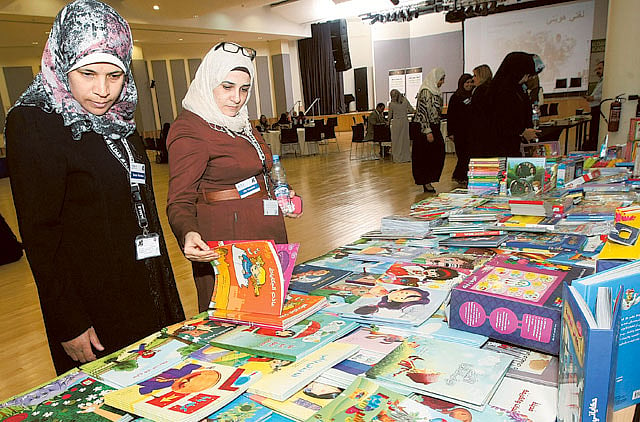Abu Dhabi The limited use of Arabic in domestic settings, and a lack of resources to support learning it, is still discouraging young pupils from gaining real proficiency in the language, experts said in the capital yesterday (Sunday).
They,therefore, urged educators to develop materials and books to engage young children in the language, and also to ensure that pupils learn to use Arabic in their daily lives. In addition, non-Arab pupils should also be taught about Arabian cultures so that they develop an interest in mastering the language.
“We want to ensure that Arab children understand how learning Arabic is intrinsically linked to their national identities. There is an acknowledged dearth of books to cater to younger readers, and the Abu Dhabi Education Council (Adec) is therefore encouraging teachers to write their own materials and source information from beyond the textbook,” Dr Karima Al Mazroui, curriculum division manager at Adec, told Gulf News.
“In addition, we supply up to a 100 new titles every year to each public school grade level so that children have access to age-appropriate reading,” she added.
Dr Karima was speaking on the sidelines of a conference that discussed the challenges in Arabic language teaching and learning, as well as appropriate pedagogies to overcome these. The conference, which was attended by nearly 60 educators, was organised by Aldar Academies, a private education provider in Abu Dhabi emirate that currently runs six schools offering a variety of curricula.
Traditional learning methods and their inefficacy in promoting language learning was one of the issues explored at the conference.
“At Abu Dhabi public schools, we have found that pupils are often ready to master Arabic. On the other hand, teachers find it hard to adopt new methods. Many are still used to teaching directly from the textbook,” Dr Karima explained.
The Adec therefore recommends the use of educational games like Scrabble for pupils in Cycle 2 (Grades 6 to 9) and higher, as well as illustrated alphabet box sets for younger children.
“These box sets teach the alphabet using culturally relevant words and phrases, thus enhancing children’s national identity as well. We also urge teachers to use resources like educational TV programmes that generate enthusiasm for Arabic,” the official said.
The Adec also launched a campaign last Thursday, entitled Abu Dhabi Reads, to promote reading among young children. The two-week initiative is placing special emphasis on Arabic reading and creative writing, Dr Karima noted.
Experienced Arabic language teachers at the conference also advised that pupils be allowed to take an active role in their own learning.
“For example, pupils are much more keen to learn a language if they are allowed to conduct research and share information with their peers. These techniques, which are widely used in English language learning, must also be implemented for Arabic,” said Hikmat Dweik, senior Arabic consultant at Cambridge Education.
Dweik added that there is also a need for professional development for teachers so that they become comfortable in using such child-centred methods of teaching.
For non-Arab learners, Abu Saleh Luqman, secondary Arabic education development officer at Aldar Academies, recommended the use of extensive role playing, and activities that immerse pupils in Arabian traditions.
“Many of these children learn Arabic as a third language, and it is therefore useful when they are fascinated by the culture itself,” he added.
Sign up for the Daily Briefing
Get the latest news and updates straight to your inbox
Network Links
GN StoreDownload our app
© Al Nisr Publishing LLC 2026. All rights reserved.
